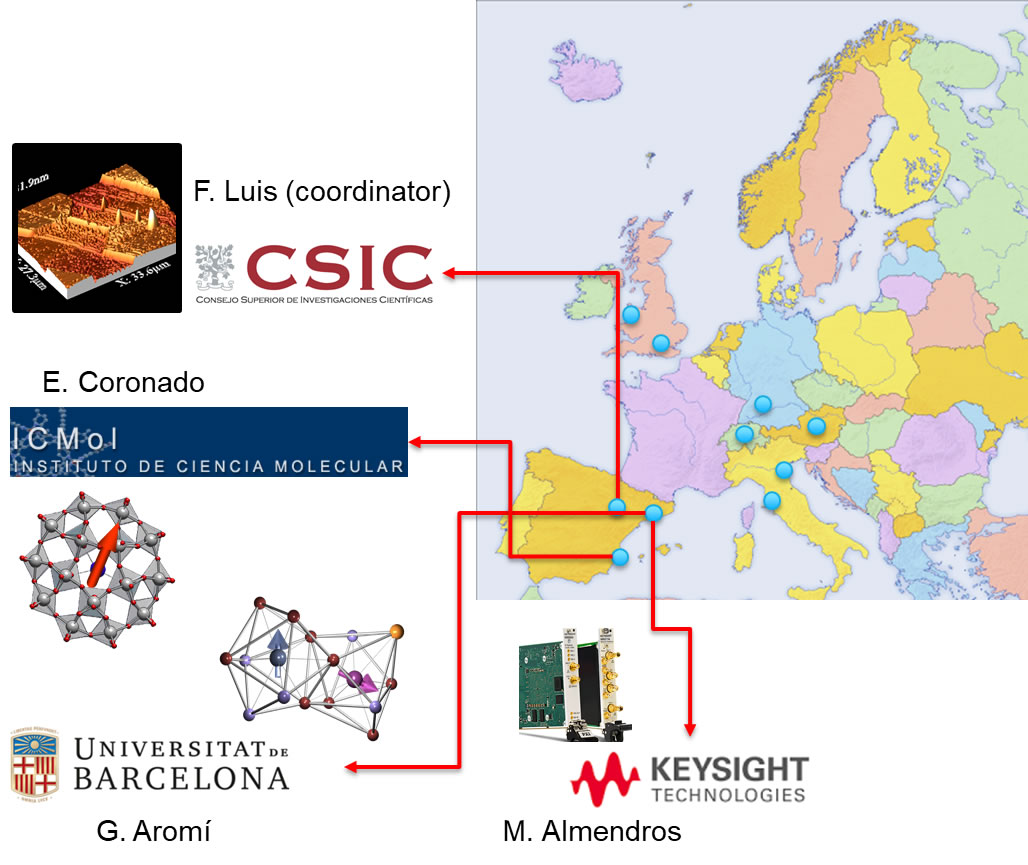
Consejo Superior de Investigaciones Científicas (CSIC)
CSIC is the largest public multidisciplinary research organisation in Spain. CSIC collaborates with national and international universities, public RTD organisations, SMEs, companies and other institutions of a scientific/technological nature. It has a staff of more than 10,900 employees. Among these, about 3,500 are permanent researchers and more than 4,000 are pre- and post-doctoral researchers. CSIC has 123 institutes or centres distributed throughout Spain, including 53 Joint Research Units (JRU) with universities or other research institutions. Two CSIC research institutes will contribute to FATMOLS.
The Aragón Materials Science Institute (ICMA) is a Joint Research Institute between CSIC and the University of Zaragoza (UZ), which will be acting as a linked third party in FATMOLS. ICMA will characterize magnetic molecules at low and very low T using home-made cryogenic sensors (mSQUID susceptometers, nanoSQUID sensors, mHall magnetometers, micro- and nano-calorimeters). Using access to micro- and nano-fabrication facilities, this node will also collaborate with CAB in the design, fabrication and test of superconducting nano-resonators and experiments with spin ensembles and will carry out the nano-patterning of suitable molecular spin qubits by dip-pen nanolithography and/or chemical methods. On the theory side, ICMA will design nano-resonators with periodic arrays of nano-constrictions, model the interaction between molecular spins and superconducting substrates and evaluate spin-photon couplings to these circuits. Finally, it will study the optimal computational architecture to implement a surface code with magnetic molecules.
The Centre of Astrobiology (CAB) is a Joint Research Institute between CSIC and INTA. Only researchers from CSIC take part of FATMOLS. CAB hosts ~170 employees with strong multidisciplinary background such as Biology, Physics, Engineering or Geology. Its main objective is to study the origin and presence of life in the Universe and it provides scientific and instrumental support for different space missions such as NASA’s Insight mission or ESA’s SPICA and ATHENA missions. Using their previous experience with sensors based on KIDs, CAB will carry out the design, fabrication and low-temperature tests of SC chips hosting several (from 1 to 100) lump-element resonators with different resonant frequencies, all coupled to the same transmission line. They will also collaborate with CSIC in the fabrication of nano-constrictions at the inductor lines by e-beam lithography.
The node at the UB will be composed of the Group of Magnetism and Functional Molecules, GMMF (www.gmmf-ub.com). The GMMF focuses on the design and preparation of functional molecules for the study of properties with a view on their potential application in future information technologies. The PI of this node has hold an ERC Starting Grant Project with title “Design and Preparation of Functional Molecules for Quantum Computing and Information Processing”. As a result, it has gained access to increased laboratory space now totalling 200 m2. Especially relevant is the acquisition of an X-ray diffractometer for single crystals, Bruker Apex-II Quazar, to determine molecular structures. The PI has recently been appointed Director of the Institute of Nanoscience and Nanotechnology of the UB (IN2UB), which gathers 150 permanent researchers, around 50 postdoctoral fellows and more than 80 PhD students from this institution.
Universidad de Valencia / Instituto de Ciencia Molecular (UVEG)
UVEG ranks third among Spanish universities in indexed scientific production. According to the ISI Essential Sciences Indicators data, UVEG is ranked in Chemistry among the 50 best Universities on a world scale. Such a remarkable position has been possible thanks to the work developed at the Molecular Science Institute (ICMol), which has produced more than the 90% of the highly cited papers in Chemistry and Materials Science of the UVEG. The research of ICMol (www.icmol.es) focuses on molecular nanoscience and includes the design and study of new functional materials using a molecular approach. Located at the Scientific Park of the UVEG, ICMol employs more than 150 scientific researchers and houses the most advanced systems for the preparation, characterization and study of molecules, materials and devices. ICMol is one of the few Spanish research centers that has been distinguished by the Spanish MINECO as “Research Unit of Excellence”. The excellence of this institute is also demonstrated by the fact that 4 of its researchers have been awarded with an ERC grant.
Keysight Technologies Inc. is the world’s leading electronic measurement company, transforming today’s measurement experience through innovations in wireless, modular, and software solutions. With its HP and Agilent legacy, Keysight delivers solutions in wireless communications, aerospace and defence and semiconductor markets with world-class platforms, software and consistent measurement science. The company’s nearly 12,600 employees serve customers in more than 100 countries.
The Quantum Engineering Solutions Team is the group dedicated to the design and marketing of electronic solutions for quantum computing, quantum communications and quantum sensing applications and is part of Keysight’s Internet Infrastructure Solutions Group. Keysight continues to increase its investment and commitment to support researchers in Quantum Engineering. The importance of the Quantum Engineering Solutions Program within Keysight is underlined by the oversight of the activities by the Vice President and General Manager of our Internet Infrastructure Solutions Group and the support of different groups including Keysight Labs experts in mw technologies. This is to ensure visibility and to ensure that the research needs of quantum engineering scientists are being understood and appropriately addressed. The Keysight team, led by Marc Almendros, provides disruptive high-performance technology based on state-of-the-art FPGA and property ASIC designs and leverages decades of micowave measurement science expertise. Keysight know-how in high-performance data acquisition, real-time digital data processing and mw electronics control will add important value to this consortium. Within FATMOLS, they provide the supporting hardware and software pillars for the control of time-resolved ESR experiments with arbitrarily generated pulses and of the on-chip hybrid processor developed by the other members of the consortium.
